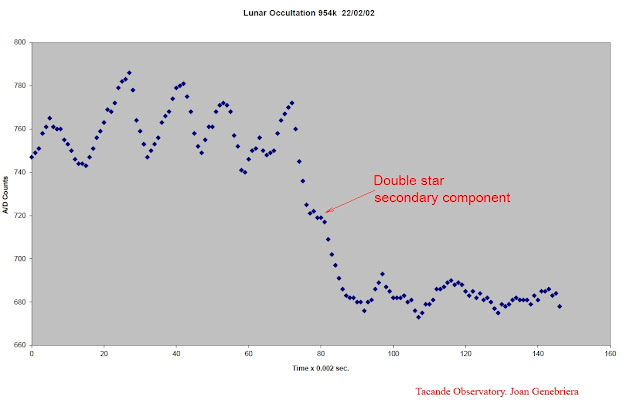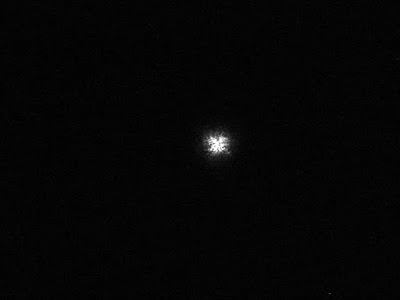ASTRONOMY ACTIVITIES
ACTIVIDADES DE ASTRONOMÍA
The landscape and celestial photographs shown below have been taken by the author. Enjoy!
Las imágenes astronómicas y de paisaje han sido realizadas por el autor ¡Que las disfruten!

Sunrise at the Tacande Observatory, La Palma

Workshop members at work

Using the dedicated software WinScan from Mr. C. Flohr (thank you!) it is possible to turn your CCD camera (ST8) into a fast photometer.

Using the dedicated software WinScan from Mr. C. Flohr (thank you!) it is possible to turn your CCD camera (ST8) into a fast photometer.
Mars in a favorable approach. just one single image without stacking
Sunrise while we wait for the transit of Mercury, La Palma

8th of June 2004. Transit of Venus. Last time until 2117

Sunrise while we wait for the transit of Venus, La Palma

Saturn's moons in negative image, T400 + ST8XE
Astronomy class in the observatory
Position of the exoplanet XO-2b. The star below (ref 10.66 (R)) is a reference star of magnitude 10.66 in band R, T400 + ST8XE
90 mm. diameter H-alpha filter, 0.6A bandwidth on a R120S refractor
Giant Sun dark spots in white light filter, R120S

Sun watching
Optical bench for solar projection and Sun observation with a coronagraph
Tacande summer sky. Sigma 15mm + Canon 350D
Tacande summer sky. Sigma 8mm + Canon 350D
M27 nebula. Testing the new T500 telescope + FLI 3200, LRGB composition
omega Centauri, the large globular star cluster R120S + ST-8300M
M1 Crab nebula. T400 + ST8XE, LRGB composition
Comet C/2013 R1 Lovejoy. T400 + ST8XE, composition of 11 images

Comet C/2013 R1 Lovejoy. T400 + ST8XE (false color)

Comet C/2013 R1 Lovejoy, T400 + ST8XE. Notice the two core emission jets detected using a rotational gradient filter
Sculptor galaxy T500 + FLI 3200
Geminid meteor activity over 2h. Six bright stripes are visible! Canon 350D
Brightest meteors recorded on 15/01/2015 at Geminid peak!
Isophotopic distribution of comet C/2013 US10 Catalina, Tacande Observatory. T400 + SBIG ST8XE
beta Orionis (Rigel) with bad seeing. T400 + DMK21 at 60 fps

beta Orionis (Rigel) with good seeing. T400 + DMK21 at 60 fps

Detection of a fast comet by accumulating many images of 10 sec. exposure

Perihelion orbit of comet P/2016 BA14

Astrometric reduction and detection of comet P/2014 BA14
09/05/2016 Transit of Mercury in front of the Sun

Globular cluster omega Centauri. Vixen R120S+Canon 6D, single 2 m exposure
Some of the Palomar series of globular clusters count on being the most distant objects in our galaxy such as Palomar 4 which is 100 Kparsec (356,000 l.y) from us, beyond the Magellan satellite galaxies of the Milky Way.
T500 F/2.8 + FLI 3200

alpha Scorpii, Antares. Explore Scientific ED80 + Canon 6D

Nebula M8. Vixen R120S + ST8300M telescope. Exposure: 600 sec.

Wide-field H-alpha image of the M8 - M20 region. Canon 2.8/200 + 1.4x + 6nm H-alpha filter + ST8300M. 5x600 sec. exposure

Galaxies M31, M32, M110 Vixen R120 + Canon 6D 15 m. exposure

H-alpha image of NGC1499. Canon 2.8/200 + 1.4x + 6nm H-alpha filter + ST-8300M. 3x600 sec. exposure

The Moon in "super" Perigee

Perigee and Apogee, compare moon sizes!

Rosetta Nebula. Canon 3.5/200 + 6nm H-alpha filter + ST-8300M. 4x600 sec. exposure

Rosette Nebula. Vixen R120 + Canon 6D ISO 800 6x300 sec. exposure

The distant globular cluster NGC 2419. The first bright star at right has a 7.4 magnitude. The image reaches a limit of 21.1 magnitude
T400 + ST8XE, 15 m. exposure.

Photometry and Astrometry with a 200mm Canon lens + ST-8300M camera. FOV: 10.28 x 6.88 degrees. 1 minute exposure

Photometry and Astrometry with a 200 mm Canon lens.
Magnitude limit around 16.5

Double star gamma Virgo. T400+ ASI174MM exp: 10 msec

Astrometry course. Gran Canaria, May 2017

Analematic Sundial in Tacande

June 21, Summer solstice. The Sun at noon
The new Astropriorat Observatory at la Torre de Fontaubella, Catalonia, Spain

Inside the observatory Ritchey-Cretien 406 mm telescope

Installation of the equatorial mount on the pillar

Telescopes and CCD camera with 36x36 mm sensor

Meeting room
Inside the observatory

The observatory, South view

Starting a good observation session
Telescope rear view

THE XV CONFERENCE AT ASSOCIACIO ASTRONOMICA DE TORROJA DEL PRIORAT

LECTURE AT XV CONFERENCE ASSOCIACIO ASTRONOMICA DE TORROJA DEL PRIORAT
Central Orion constellation, Canon 2.8/200 + Canon 6D
mu Cephei a prototype of Carbon stars, spectral type M2Ia
telescope RC 406 + G4-16000 RGB
telescope RC 406 + G4-16000 27/01/2023
Galaxy, 3xL 3 minutes each telescope RC 406 + G4-16000
Milky Way, Deneb Canon 200mm+Canon 6D
Milky Way, Sagittarius region, Canon 200mm+Canon 6D
For more details on the
equipment and techniques used, see the page: Astronomical
Observatory Handbook on this blog
Para más información de
las técnicas y el equipo empleado, ver la página: Manual
del Observatorio Astronómico en este blog




























































Sorry for this delayed answering to your kind message. The observatory and property was sold months ago but I'm continuing my astronomy activities from main land Spain in Tarragona area, By now still very busy
ReplyDelete